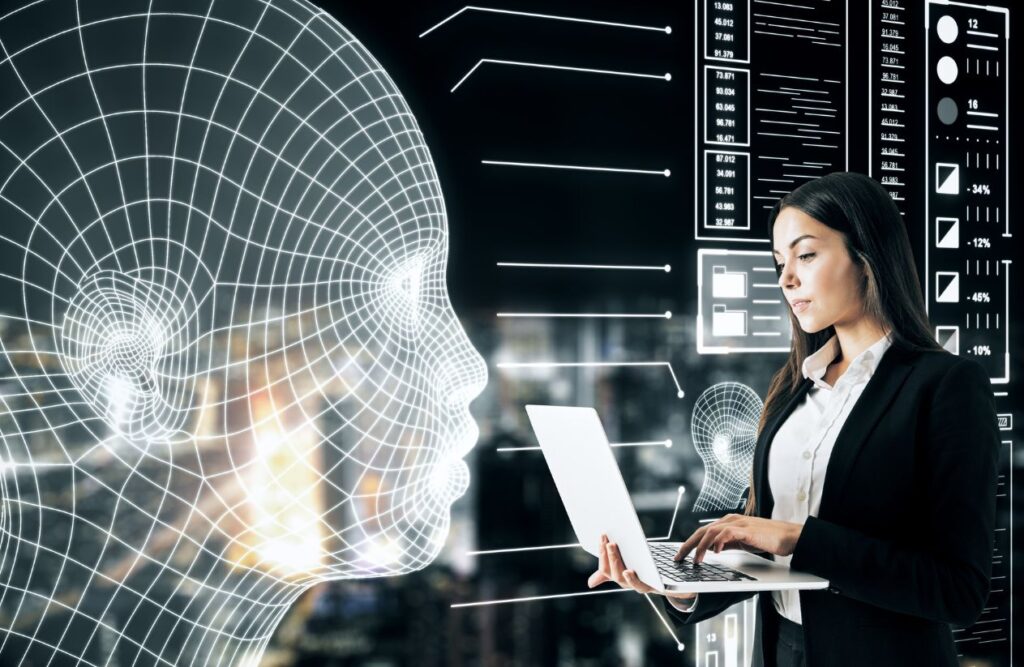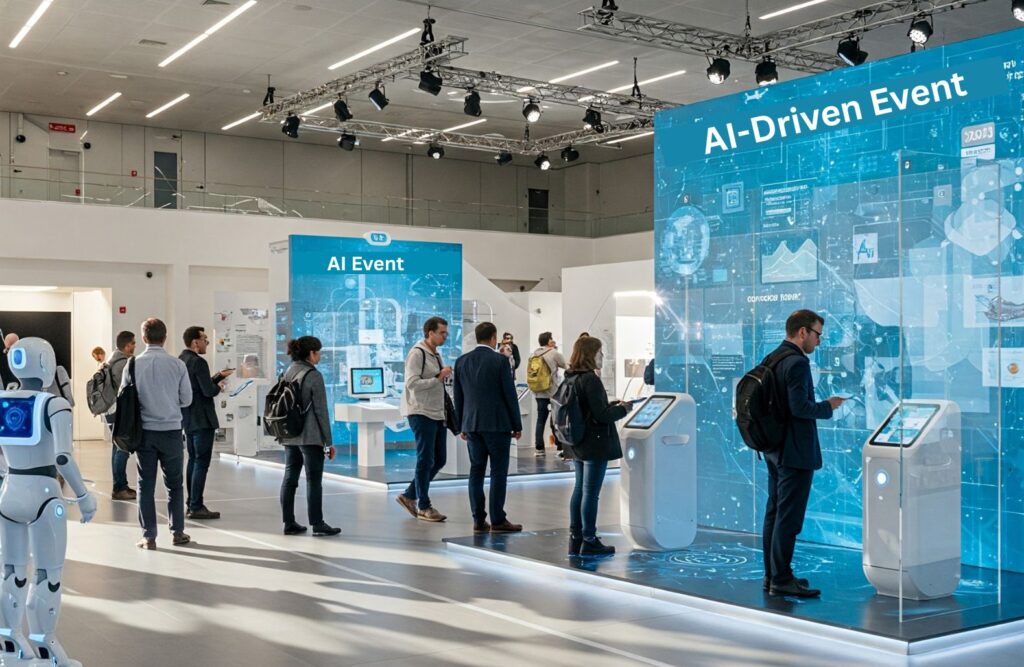In our increasingly interconnected world, Artificial Intelligence (AI) has moved from the realm of science fiction to an integral part of our daily lives, from personalized recommendations to smart home devices.
This technological tide is now powerfully reshaping the event industry. Consider this: events leveraging AI have reported a 20% increase in attendee satisfaction scores, a testament to the technology’s profound impact.
Beyond mere automation of tasks like registration, AI is ushering in an era of genuine experience enhancement in event technology. This blog post will explore the key ways AI is revolutionizing event management and attendee engagement.
We will delve into how AI is transforming event technology, unlocking unprecedented potential for increased efficiency, hyper-personalization, and groundbreaking interactive experiences that are captivating audiences like never before.
The Rise of Intelligent Events: AI’s Foray into the Event Horizon

The event landscape is no stranger to technological evolution. From basic ticketing systems to sophisticated event management software, each innovation aimed to streamline processes and enhance attendee experiences.
However, the increasing sophistication and accessibility of Artificial Intelligence (AI) are creating a true paradigm shift, moving us beyond incremental improvements to a fundamental reimagining of what events can be.
This isn’t simply about adopting the latest tech buzzword; the integration of AI in event technology signifies a move towards creating more intelligent, responsive, and ultimately, more meaningful and impactful event experiences for both organizers and attendees.
Where previous tools often focused on singular aspects of event management, AI offers a holistic approach, capable of learning, adapting, and predicting needs in ways never before possible.
The limitations of past technologies – the inability to truly personalize at scale, the reactive nature of logistical adjustments, and the constraints on creating deeply immersive interactions – are now being overcome by the transformative power of AI.
Related Content:Every Amateur Event Planner Should Know
Hyper-Personalization: Sculpting Individual Attendee Experiences with AI Precision

One of the most profound ways AI is transforming event technology lies in its capacity to move beyond broad segmentation to true hyper-personalization.
Imagine an event where each attendee feels like it was designed specifically for them. This is the promise of AI.
By intelligently analyzing vast datasets, AI empowers event organizers to craft unique attendee journeys, fostering deeper engagement and lasting loyalty.
Pre-Event: The personalization begins even before the event commences. AI-powered registration forms can go beyond basic information gathering, delving into attendee interests, professional goals, and even learning styles through adaptive questioning.
This rich data fuels sophisticated recommendation engines that suggest relevant sessions, speakers, and even potential networking connections based on individual profiles and past event behavior.
Forget generic pre-event emails; AI enables personalized communication, delivering tailored content previews, speaker spotlights aligned with interests, and even customized schedule suggestions to each attendee, ensuring they feel seen and understood from the outset.
During the Event: The personalization continues dynamically throughout the event. AI-driven mobile applications act as personalized guides, offering tailored schedules that adapt based on real-time engagement and location within the venue.
Imagine an app suggesting a workshop based on the session an attendee just finished or recommending a networking lounge where individuals with similar interests are currently gathered.
AI-powered chatbots move beyond basic FAQs, offering contextual assistance and personalized recommendations, answering individual queries with relevant information and guiding attendees to specific resources or locations.
Content delivery can also be personalized, with digital signage displaying information relevant to nearby attendees or session content adapting based on audience interaction.
Post-Event: The personalized experience extends beyond the event itself. AI analyzes attendee feedback with granular detail, identifying specific preferences and areas for improvement. This allows for highly targeted follow-up communications, providing attendees with resources and content directly related to their interests and the sessions they attended.
Personalized thank-you notes, links to specific recordings, and even tailored surveys ensure that attendees feel valued even after the event concludes.
This level of post-event engagement strengthens the connection with the event brand and provides invaluable insights for future planning.
The impact of this AI-driven hyper-personalization is significant. Attendees feel more connected, engaged, and valued when their individual needs and interests are catered to.
This translates directly into higher satisfaction rates, increased participation, and stronger loyalty to the event and its organizers.
By crafting these unique attendee journeys, AI is not just improving events; it’s fostering meaningful connections and creating truly memorable experiences.
AI: The Event Planner’s Strategic Partner in Unleashing Efficiency

In the fast-paced world of event planning, time and resources are paramount. Artificial intelligence is emerging not just as a futuristic novelty, but as a critical strategic ally, fundamentally altering how event professionals approach planning and execution.
By automating tedious tasks and providing insightful data-driven predictions, AI is unlocking unprecedented levels of efficiency in event technology, empowering planners to focus on the creative and strategic aspects of their work.
Predictive Analytics: Foresight for Flawless Execution: Imagine having the ability to anticipate challenges before they arise.
AI-powered predictive analytics makes this a reality. By meticulously analyzing historical data – past attendance figures, weather patterns, speaker popularity, and even social media sentiment – AI algorithms can forecast future trends with remarkable accuracy.
This foresight allows for optimized venue selection based on anticipated crowd sizes and logistical needs. Staffing levels can be precisely adjusted to match predicted peak times, minimizing both understaffing and unnecessary costs.
Catering orders can be fine-tuned based on expected dietary requirements and attendance, reducing waste and ensuring adequate supplies. This data-driven approach, facilitated by AI, minimizes guesswork and maximizes resource allocation.
Automated Logistics: Streamlining the Foundational Elements: The intricate web of event logistics, from initial registration to final check-out, often consumes significant time and effort.
AI-powered tools are revolutionizing these foundational elements. AI-driven registration platforms can handle attendee sign-ups, process payments, and generate personalized badges with remarkable speed and accuracy.
Ticketing systems integrated with AI can manage sales, track inventory, and even identify potential fraudulent activity. On-site, AI-powered check-in kiosks and facial recognition technology can expedite entry, reducing queues and improving the attendee experience.
Furthermore, AI can streamline vendor management, assisting with contract tracking, communication, and even performance evaluation.
Real-time Problem Solving: Intelligent Responses to Dynamic Situations: Even with meticulous planning, unforeseen issues can arise during an event. AI offers real-time problem-solving capabilities that were previously unimaginable.
Sensor data and AI algorithms can monitor crowd density, identifying potential overcrowding in specific areas. Chatbots can handle a surge in inquiries, providing immediate assistance and directing attendees to resources.
AI-powered platforms can analyze social media feeds for real-time sentiment, allowing organizers to address negative feedback or emerging issues proactively.
By identifying potential problems as they develop, AI empowers event teams to respond swiftly and effectively, minimizing disruption and ensuring a smoother experience for everyone.
AI-Powered Communication: Intelligent Assistance at Scale: Effective communication is crucial for a successful event. AI-powered chatbots and automated messaging systems can handle a significant volume of routine inquiries, freeing up human staff to focus on more complex and nuanced interactions.
These AI assistants can provide information on schedules, directions, speaker bios, and frequently asked questions, offering instant support to attendees. Automated email sequences, personalized through AI insights, can deliver timely updates and reminders, ensuring attendees are well-informed.
This intelligent communication not only enhances attendee satisfaction but also significantly reduces the workload on event staff.
The integration of AI in event planning translates into tangible benefits. Event organizers are experiencing significant time savings by automating repetitive tasks and leveraging AI for faster data analysis.
Cost reductions are realized through optimized resource allocation and minimized errors. Moreover, the accuracy of logistical operations and data management is significantly improved, leading to smoother, more efficient, and ultimately more successful events.
AI is not replacing event planners; it is augmenting their capabilities, allowing them to operate more strategically and deliver exceptional experiences with greater efficiency.
Immersive Experiences: Weaving AI into the Fabric of Event Engagement

Beyond personalization and efficiency, Artificial Intelligence is spearheading a new frontier in event technology: the creation of truly immersive and captivating experiences.
By seamlessly blending the physical and digital realms, AI-powered technologies are transforming passive attendance into active participation, leaving lasting impressions on eventgoers.
AI-Driven VR and AR: Stepping Beyond Reality: Virtual Reality (VR) and Augmented Reality (AR), fueled by AI, are unlocking unprecedented levels of engagement.
Imagine prospective attendees taking a fully immersive virtual tour of a conference venue from the comfort of their homes, guided by an AI avatar that answers their questions in real-time.
During the event, AR overlays on attendees’ smartphones could provide contextual information about speakers, exhibitors, or even translate foreign languages in real-time.
Interactive VR experiences can transport attendees to simulated environments for training exercises, product demonstrations, or even collaborative brainstorming sessions, breaking down geographical barriers and fostering deeper understanding.
For entertainment, AI-driven VR concerts could offer fans a front-row seat or even the chance to virtually interact with performers on stage, while AR games integrated into the event space can encourage networking and exploration in a fun and engaging way.
Interactive Installations: When Technology Responds to You: AI is also powering a new wave of interactive installations that respond dynamically to attendee behavior. Imagine walking past a digital art display that shifts and evolves based on your movements and proximity, tracked by AI-powered sensors.
Personalized digital signage could display content tailored to individual attendees as they approach, offering relevant information or even personalized greetings.
Gamified experiences, driven by AI, can track attendee participation in various activities, awarding points and displaying leaderboards in real-time, fostering friendly competition and encouraging engagement with different aspects of the event.
These interactive elements transform static displays into dynamic, engaging touchpoints.
AI in Entertainment: The Dawn of Intelligent Performances: The world of event entertainment is also being revolutionized by AI. Imagine a live musical performance where AI algorithms analyze the audience’s mood in real-time (gleaned from social media sentiment or even subtle shifts in ambient noise) and adjust the tempo, melody, and lighting of the music accordingly, creating a truly symbiotic experience.
AI-powered visual effects can generate stunning and dynamic visuals that react to the music, the performers’ movements, or even the audience’s applause. Robotic performers, guided by sophisticated AI, can execute complex dance routines or deliver engaging performances alongside human artists, blurring the lines between technology and artistry and offering truly unique entertainment spectacles.
Real-time Engagement Analytics: Adapting on the Fly: Perhaps one of the most powerful aspects of AI in enhancing engagement is its ability to provide real-time feedback on audience reactions.
AI algorithms can analyze facial expressions captured by discreet cameras, track sentiment on social media platforms using natural language processing, and monitor engagement levels with interactive elements.
This real-time data provides invaluable insights to event organizers, allowing them to adjust programming, speaker pacing, or even the layout of the event on the fly to maximize audience interest and participation. If a particular session is generating high levels of positive sentiment online, organizers can promote it more actively.
If attendees appear disengaged during a specific activity, adjustments can be made in real-time to recapture their attention. This dynamic adaptability ensures that the event remains relevant and engaging throughout its duration.
By weaving AI into the fabric of event experiences through VR/AR, interactive installations, intelligent entertainment, and real-time analytics, event organizers can move beyond simply delivering content to creating truly immersive and unforgettable moments that resonate deeply with their audiences.
You can also read our article“Unlock the Power of Augmented Reality in Events: A Future-Focused Guide”

As we embrace the transformative power of AI in event technology, it’s crucial to navigate the practical considerations and ethical implications that accompany this evolution.
Thoughtful planning and a commitment to responsible implementation are essential to harnessing the full potential of AI while safeguarding attendee trust and ensuring positive outcomes.
Data Privacy and Security: Building Trust in an AI-Enabled Environment: The sophisticated personalization offered by AI relies heavily on data collection and analysis.
This necessitates a strong focus on data privacy and security. Event organizers must be transparent with attendees about what data is being collected, how it is being used, and the measures in place to protect it.
Compliance with data protection regulations is paramount. Choosing AI solutions from reputable vendors with robust security protocols is crucial. Implementing data anonymization techniques and providing attendees with control over their data preferences are essential steps in building and maintaining trust in an AI-driven event environment.
Strategic Implementation: Integrating AI for Maximum Impact: Selecting and implementing AI tools effectively requires a strategic approach. Rather than adopting every new AI technology, event planners should identify specific pain points or areas for improvement within their event lifecycle and choose AI solutions that directly address those needs.
Consider starting with targeted applications, such as AI-powered chatbots for customer service or AI analytics for post-event feedback analysis. Seamless integration with existing event management software and other technology infrastructure is also a key consideration to avoid data silos and ensure a cohesive operational flow.
Thorough testing and training for event staff are vital to ensure the successful adoption and utilization of new AI tools.
Preserving the Human Element: AI as an Enhancer, Not a Replacement: While AI offers remarkable capabilities, the human touch remains indispensable in creating truly memorable event experiences.
The warmth of a genuine welcome, the empathy of a human problem-solver, and the energy of live interaction are elements that AI cannot fully replicate. The most successful integration of AI in event technology involves augmenting human capabilities, freeing up event professionals from repetitive tasks to focus on higher-level strategic thinking, creative design, and meaningful engagement with attendees.
AI should be viewed as a powerful assistant, enabling event teams to deliver more personalized and efficient experiences while retaining the essential human connection that makes events so valuable.
The Future Landscape: Emerging Trends in AI for Events: The field of AI is constantly evolving, and the future of AI in events holds exciting possibilities.
We can anticipate even more sophisticated AI-powered personalization, with truly adaptive event environments that respond in real-time to individual and collective attendee behavior.
AI could play a larger role in content creation, generating dynamic presentations or even assisting speakers with real-time audience analysis and feedback. The integration of AI with the metaverse and other immersive technologies could lead to entirely new forms of hybrid and virtual events.
Furthermore, advancements in natural language processing could lead to even more intuitive and human-like interactions with AI assistants. Staying informed about these emerging trends will be crucial for event professionals looking to leverage the cutting edge of AI in event technology and create truly future-forward experiences.
Conclusion
So, what’s the big takeaway here? It’s that AI isn’t just some shiny new gadget for event folks; it’s genuinely changing the game.
We’ve seen how it’s making events feel tailor-made for each person, taking the headache out of planning, and even crafting those wow moments that stick with you long after the event ends. And honestly, this is just the beginning.
The way AI is transforming event technology right now is exciting, but what’s coming down the pipeline? Think even smarter personalization, even more seamless logistics, and experiences that blur the lines between reality and imagination.
If you’re in the events world, now’s the time to dive in, experiment, and see how AI can help you create truly unforgettable experiences. Ready to see what AI can do for your next event? Let’s explore the possibilities together!
Looking for a DJ that you can hire for the event? Below is a list of DJs that we recommend that you book or hire for the event:
How AI is Transforming Event Technology- FAQ Section
As the landscape of event planning evolves with the integration of Artificial Intelligence (AI), many professionals have questions about how to best navigate these changes.
This FAQ aims to shed light on common inquiries, ensuring that tech-savvy event planners can leverage AI to its fullest potential.
How Can AI Enhance Event Planning?
AI technology can streamline various aspects of event planning, from personalized marketing strategies to efficient logistics management. AI can identify trends and preferences, allowing planners to tailor events to their target audience.
How to Address Privacy and Ethical Concerns Using AI In Event Management?
Always comply with data protection regulations, be transparent with attendees about how their data is used, choose AI solutions that prioritize security, and use AI ethically to enhance attendee experiences without overstepping boundaries.
How to Adapt to AI-Driven Changes in Event Management?
Start small: Address specific problems with targeted AI tools (chatbots, etc.). Stay up-to-date on new AI developments and how they might benefit your events.






